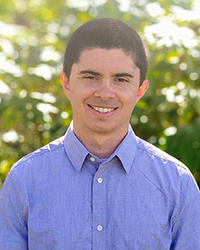Meet Tommy McAuliffe, an alum of the UW Online Master of Public Health (MPH).

LEAD Program Supervisor, Sea Mar Community Health Centers
While working as a firefighter and emergency medical technician (EMT), Tommy McAuliffe realized that emergency medical services (EMS) and law enforcement spent a significant amount of time helping those suffering from mental health and substance abuse issues and extreme poverty.
McAuliffe wanted to earn a master’s in public health at the UW so he could understand the bigger picture. “I wanted to understand how social determinants of health, our society’s structures and our governing systems operated and how they maintained inequities and created poor health outcomes for these vulnerable populations,” McAuliffe said.
Here, the 2020 graduate shares his experience as a student in the UW Online MPH program and how the program helped him grow his career.
Would you describe your current role?
As a LEAD (Law Enforcement Assistant Diversion) program supervisor through Sea Mar Community Health Centers, I manage the work of five case managers who provide health and social services to people that have high interactions with law enforcement as well as the criminal justice system.
Why did you decide to pursue an MPH?
I wanted to understand why our society and governing systems produced poor health outcomes for vulnerable populations and then learn how to develop and manage data-driven programs to address these issues. I was specifically interested in a master’s program where I could learn how to collect, aggregate and display quantitative and qualitative data.
Why did you choose the UW Online MPH program?
Unlike many other programs, the UW Online MPH program enabled me to attend class in the evenings while working full time during the day. I also liked how the UW Online MPH cohorts consisted of a diverse group of working professionals and how the UW professors cared about their students’ needs.
What skills did you gain from the program that you use in your career today?
Program evaluation was a huge skill. Having the opportunity to evaluate programs of such a high caliber, specifically through my capstone with Public Health – Seattle & King County, was a tremendous opportunity for me and definitely guided me into the position that I’m in now. The master’s program also provided me with the opportunity to network with agencies that I was interested in.
What were your practicum and your capstone about?
For my practicum, I developed strategic communication plans for the syringe service program through the Whatcom County Health Department.
For my capstone, I evaluated a program where case managers from the Retention, Expansion and Collaboration Hub (REACH) program within Public Health – Seattle & King County were being integrated into the Puget Sound Fire Authority’s and Renton Fire Authority’s Fire Department Community Assistance, Referrals and Education Services (FDCARES) program. The program ultimately hired more case managers to better respond to low triage acuity issues — meaning issues that were not severe enough for a hospital stay — for high 911-utilizing populations, specifically homeless populations.
You mentioned the UW faculty. What did your instructors bring to the program?
Our instructors shared their strong, research-based background. I also appreciated learning from our instructors, who were physicians, on how medical and social services can intertwine and be cohesive, rather than remain siloed entities.
I appreciated our faculty’s attentiveness. My practicum adviser would check in periodically to see how my project was going. Our professors were accommodating and encouraged students to maintain a good work, life and school balance. I never felt overwhelmed by the workload because they developed our project timelines knowing we were working professionals.
What was the online experience like for you?
I loved the online format. While in this program, I worked as a firefighter and EMT for Alcoa and for a fire department in Whatcom County. One of the big advantages of the online format was the opportunity to attend a class lectures delivered in Seattle while living and working in Bellingham.
What were the on-site sessions like?
The on-site sessions strengthened my communication and collaboration skills. The opportunity to work in groups with our cohort allowed us to understand our peers’ goals and how our values are aligned.
More Online MPH Alumni